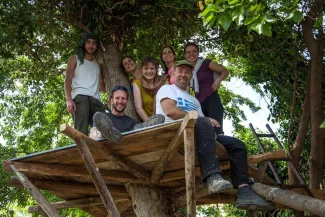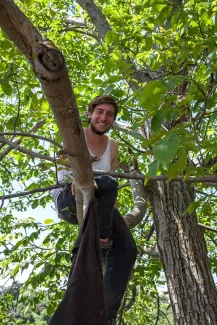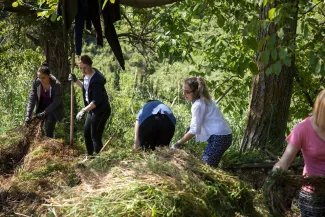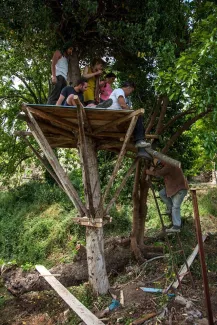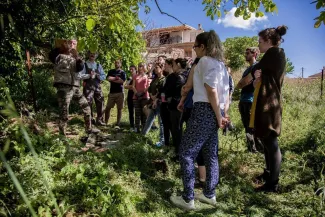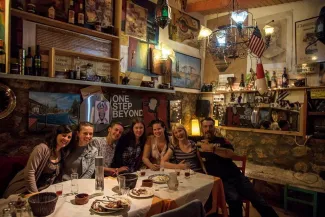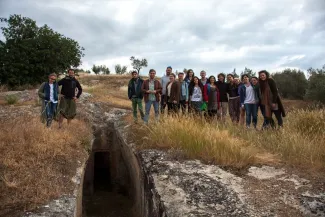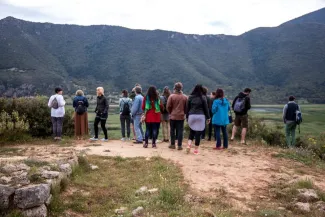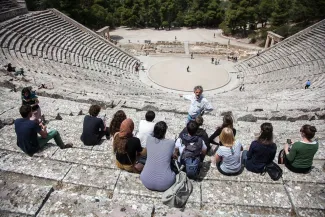During the period 4-11 of May 2016 the training seminar on sustainable development “Green living in the rural area” was hosted by Filoxenia in Kryoneri Korinthias, Greece.
Filoxenia is a Youth association founded in 1995. It offers educational & free time activities in the rural mountainous village of Kryoneri in Corinth upper land.
This project has been supported by the European Commission programme Erasmus+ and co-ordinated by the organization EJL (Liechtenstein).
EJL is a Youth Organisation active in the field of non formal education, based in Ruggell, Liechtenstein. EJL stands for "European Youthleaders Liechtenstein". It is an organisation founded by the former participants of an international youth leader course.
“Green living in the rural area” is a multiple project, consisting of 3 activities: 1 mobility of youth workers & 2 group EVS projects.
The training course “Green living in the rural area” intends to train youth workers to reuse and recycle materials and provide them with the competences to act as multipliers in their own organisations.
The planing and implementation of the following practical issues was included in the training's programme: promotion of land tourism's sustainability; reusing material for wooden constructions; construction of a tree-house for environmental seminars.
Those chosen objectives are having in mind the urgency of sustainable development in our societies, the idea behind this project is to empower youth workers and their organizations in terms of social and environmental responsibility, saving and optimizing of resources.
Participants coming from Liechtenstein, Slovakia, Czechia, Turkey, Italy, Spain, Romania, Germany, United Kingdom and Greece had the opportunity during the seminar to explore cultural diversity and identify the opportunities and challenges it represents.
Different workshops, study visits, outdoor activities and lectures, have raised awareness about sustainability, environmental protection, food-culture, healthy life style, exchange of best practices and networking.
The experts offered a practical introduction in the Tree house construction: Fredi Shalcanij and Giannis Korinis undertook a simple and cheap method of building a tree house platform, with light roof and walls from reed. The wood came from an old stone house (1880) close by, which is under reconstruction. The reed, growing on the spot, has been cut and cleaned by the participants. The discussions concerning the construction have been lively carried out by the participants and their interventions have been flowing into the construction phase. The learning by doing scheme has involved participants and constructors as well.
In the short period of time, the stabilization of the platform has been successfully achieved. The EVS volunteers following in June will finalize the tree house (roof & walls).
During the project, the experts and facilitators encouraged as much as possible the "learning by doing" and used several methods of non-formal education.
A good practice of sustainable development that Filoxenia is involved since 1995 is the Environmental footpath of Kyroneri, where participants had the opportunity to see, learn and help the maintenance of the footpath.
Another best practise example of sustainable development that participants where involved, is the reconstruction of a traditional farmer's stone house for educational purposes.
The participants had also an insight presentation of the Secretary General of the Greek Agrotourism Federation SEAGE and board member of the European Rural Tourism Federation EUROGITES, Mr Panos Poulos.
Cultural visits in archaeological sites of Nafplio, Epidaurus, Nemea, the Mycenaean cemetery of Aidonia and the Environment Museum of Stymfalia, have been also part of the programme.
A study visit in the Byzantine Monastery of Lechova gave an example of local community's support to sustain a monument with own resources and contribute to the sustainable development of the area.
Evening activities such as the visit in the agrotouristic Taverna in Bozika, which uses “Zero Kilometres Kitchen” food ingredients, public cinema night in Polykentro of Kryoneri, with the movie from film director Icíar Bollaín “También la lluvia” (Even the Rain), presenting the mobilization of a local society in Bolivian highlands to preserve the right to access water sources, promoted also the topic of our seminar.
The seminar took place at the Hostel “Elisson” in Kryoneri (http://xenon.elisson.gr/), which promotes sustainable agritourism development and healthy life style. The geothermal plant, an innovative project of Hostel Elisson was presented, as a good example of sustainable development.
The whole project was a beautiful example, how people from different places of the world came closer together, in a small rural village and could get to know the Mediterranean kitchen and the Greek culture, by seeing, touching, smelling, tasting and feeling.
This project had a big impact to the local community involved, starting from the first day with the discovery activity “Peddy Paper” and during the whole week as well, by evening meetings and an Intercultural event in the local Youth Club, open to local community.
The organizers are looking forward for the next part of this project, the group EVS project, which Filoxenia will host during the month of June in Kryoneri Korinthias.
Many thanks to all participants!
